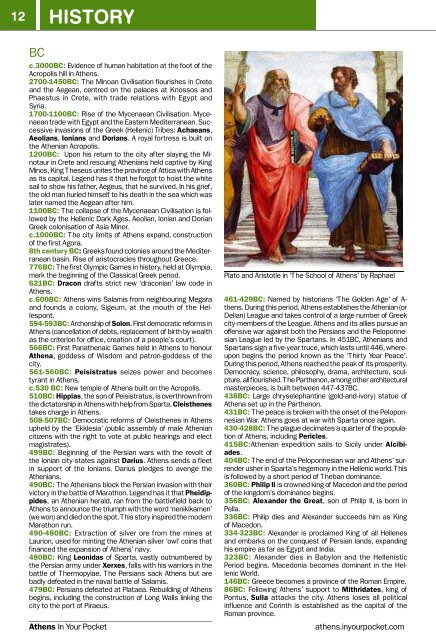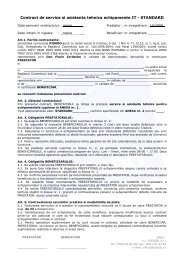Hotels Restaurants Cafés Nightlife Sightseeing Events Maps - KISADO
Hotels Restaurants Cafés Nightlife Sightseeing Events Maps - KISADO
Hotels Restaurants Cafés Nightlife Sightseeing Events Maps - KISADO
- No tags were found...
Create successful ePaper yourself
Turn your PDF publications into a flip-book with our unique Google optimized e-Paper software.
12 historyhistory13BCc.3000BC: Evidence of human habitation at the foot of theAcropolis hill in Athens.2700-1450BC: The Minoan Civilisation flourishes in Creteand the Aegean, centred on the palaces at Knossos andPhaestus in Crete, with trade relations with Egypt andSyria.1700-1100BC: Rise of the Mycenaean Civilisation. Mycenaeantrade with Egypt and the Eastern Mediterranean. Successiveinvasions of the Greek (Hellenic) Tribes: Achaeans,Aeolians, Ionians and Dorians. A royal fortress is built onthe Athenian Acropolis.1200BC: Upon his return to the city after slaying the Minotaurin Crete and rescuing Athenians held captive by KingMinos, King Theseus unites the province of Attica with Athensas its capital. Legend has it that he forgot to hoist the whitesail to show his father, Aegeus, that he survived. In his grief,the old man hurled himself to his death in the sea which waslater named the Aegean after him.1100BC: The collapse of the Mycenaean Civilisation is followedby the Hellenic Dark Ages. Aeolian, Ionian and DorianGreek colonisation of Asia Minor.c.1000BC: The city limits of Athens expand, constructionof the first Agora.8th century BC: Greeks found colonies around the Mediterraneanbasin. Rise of aristocracies throughout Greece.776BC: The first Olympic Games in history, held at Olympia,mark the beginning of the Classical Greek period.621BC: Dracon drafts strict new ‘draconian’ law code inAthens.c.600BC: Athens wins Salamis from neighbouring Megaraand founds a colony, Sigeum, at the mouth of the Hellespont.594-593BC: Archonship of Solon. First democratic reforms inAthens (cancellation of debts, replacement of birth by wealthas the criterion for office, creation of a people’s court).566BC: First Panathenaic Games held in Athens to honourAthena, goddess of Wisdom and patron-goddess of thecity.561-560BC: Peisistratus seizes power and becomestyrant in Athens.c.530 BC: New temple of Athena built on the Acropolis.510BC: Hippias, the son of Peisistratus, is overthrown fromthe dictatorship in Athens with help from Sparta. Cleisthenestakes charge in Athens.508-507BC: Democratic reforms of Cleisthenes in Athensupheld by the ‘Ekklesia’ (public assembly of male Atheniancitizens with the right to vote at public hearings and electmagistrates).499BC: Beginning of the Persian wars with the revolt ofthe Ionian city-states against Darius. Athens sends a fleetin support of the Ionians. Darius pledges to avenge theAthenians.490BC: The Athenians block the Persian invasion with theirvictory in the battle of Marathon. Legend has it that Pheidippides,an Athenian herald, ran from the battlefield back toAthens to announce the triumph with the word ‘nenikikamen’(we won) and died on the spot. This story inspired the modernMarathon run.490-480BC: Extraction of silver ore from the mines atLaurion, used for minting the Athenian silver ‘owl’ coins thatfinanced the expansion of Athens’ navy.480BC: King Leonidas of Sparta, vastly outnumbered bythe Persian army under Xerxes, falls with his warriors in thebattle of Thermopylae. The Persians sack Athens but arebadly defeated in the naval battle of Salamis.479BC: Persians defeated at Plataea. Rebuilding of Athensbegins, including the construction of Long Walls linking thecity to the port of Piraeus.Athens In Your PocketPlato and Aristotle in ‘The School of Athens’ by Raphael461-429BC: Named by historians ‘The Golden Age’ of A-thens. During this period, Athens establishes the Athenian (orDelian) League and takes control of a large number of Greekcity-members of the League. Athens and its allies pursue anoffensive war against both the Persians and the PeloponnesianLeague led by the Spartans. In 451BC, Athenians andSpartans sign a five-year truce, which lasts until 446, whereuponbegins the period known as the ‘Thirty Year Peace’.During this period, Athens reached the peak of its prosperity.Democracy, science, philosophy, drama, architecture, sculpture,all flourished. The Parthenon, among other architecturalmasterpieces, is built between 447-437BC.438BC: Large chryselephantine (gold-and-ivory) statue ofAthena set up in the Parthenon.431BC: The peace is broken with the onset of the PeloponnesianWar. Athens goes at war with Sparta once again.430-428BC: The plague decimates a quarter of the populationof Athens, including Pericles.415BC:Athenian expedition sails to Sicily under Alcibiades.404BC: The end of the Peloponnesian war and Athens’ surrenderusher in Sparta’s hegemony in the Hellenic world. Thisis followed by a short period of Theban dominance.360BC: Philip II is crowned king of Macedon and the periodof the kingdom’s dominance begins.356BC: Alexander the Great, son of Philip II, is born inPella.336BC: Philip dies and Alexander succeeds him as Kingof Macedon.334-323BC: Alexander is proclaimed King of all Hellenesand embarks on the conquest of Persian lands, expandinghis empire as far as Egypt and India.323BC: Alexander dies in Babylon and the HellenisticPeriod begins. Macedonia becomes dominant in the HellenicWorld.146BC: Greece becomes a province of the Roman Empire.86BC: Following Athens’ support to Mithridates, king ofPontus, Sulla attacks the city. Athens loses all politicalinfluence and Corinth is established as the capital of theRoman province.AD54: The Apostle Paul visits Athens and delivers the Sermonon Aeropagus Hill.150: Herod Atticus becomes governor of Athens, constructsthe theatre at the foot of the Acropolis that bears his name.330: Constantine the Great transfers the capital of the RomanEmpire to Byzantium, which is renamed Constantinople.The Byzantine Empire is established. Before his death,Constantine the Great establishes Christianity as the officialreligion of the Byzantine Empire.529: Philosophical academies closed by Emperor JustinianI, temples reconsecrated as Christian churches.1054: Schism between the Eastern Orthodox and (Western)Roman Catholic Churches.1204: Capture of Constantinople during the Fourth Crusadeby the Franks and Venetians.1453: Sultan Mohammed II captures Constantinople. Endof the Byzantine Empire.1456: Capture of Athens by Omar.1460-1715: Turks occupy all of Greece after continuouswarfare with the Venetians.1687: Venetians lay siege to Athens under Morosini. TheAcropolis, which was used as a Turkish gunpowder store, ispartially destroyed.1801: Lord Elgin removes Parthenon marbles to London.Twentieth century1910: Cretan politician Eleftherios Venizelos is electedprime minister of Greece.1912: First Balkan War. Greece, Serbia, Montenegro andBulgaria fight against the Ottomans. Greece obtains partsof Macedonia, Epirus and the north Aegean islands.1913: Second Balkan War. Greece and Serbia fight againstBulgaria. Crete unites with Greece.1914: King Constantine insists that Greece remainsneutral during the First World War. Venizelos wants to enterthe war on the side of the Allies. The King flees the countryand Greece enters the war.1919: The Allies award Venizelos, being on the winners’ side,certain parts of Turkish and Bulgarian Thrace and the rightto place troops in the area of Smyrna on the Turkish coast,where a large and prosperous Greek population exists.1921: The Greek troops begin a massive campaign andadvance towards Ankara.1922: The resurgent Turkish army drives the Greeks backto the coast and Smyrna is burnt down on August 31. Morethan a million Greeks abandon their homes and becomerefugees on the Greek mainland. There follows a massiveexchange of populations between Greece and Turkey, basedon religious faith, under the Treaty of Lausanne.1940: After occupying Albania, Italy demands the right ofpassage through Greece. Greeks respond to the Italianultimatum with a single word, “No”, on October 28. Greektroops repel the Italian forces into the Albanian mountains,advancing towards Albania during the winter.1941: In April, Germany invades Greece and the countryis occupied by German, Italian and Bulgarian forces. Thebig famine of the winter of 1941 leaves more than 40,000dead, mainly in Athens and other major cities. Greeks take tothe mountains, form resistance groups and declare a ‘FreeGreece’ on the inaccessible mountainous mainland.1944: The last Wermacht soldier departs from Athens onOctober 12. Greek and British troops enter the liberatedcapital. In December, fighting breaks out in the streets ofAthens between communist supported resistance groups1821: The Greek Revolution against Turkish occupationbegins.1827: The fleet of the mediating powers (France, Britain,Russia) destroys the Turkish fleet at Navarino. End of OttomanRule in Greece.1830: Greek sovereignty recognised under the LondonProtocol. Nauplion becomes the first capital of independentGreece.1831-1834: The assassination of the first governor ofGreece, Ioannis Kapodistrias, leads to the establishment ofmonarchy by the foreign powers. Bavarian King Otto I arrivesin Greece and Athens is established as the new capital.1838: The Royal Palace (now the House of Parliament) completedon Syntagma Square.1843: King Otto grants a constitution and representativeAssembly, following popular uprisings.1863: King Otto is dethroned and prince William of Denmarkis crowned King of Greece under the name George I. He bringsthe Ionian islands as a coronation gift from Britain.1866: Cretan uprisings against the Ottomans lead to warbetween Greece and Turkey.1877: Prime Minister Charilaos Trikoupis introduces measuresthat limit the power of the monarchy to interfere indemocratic institutions.1896: The first modern Olympic Games held in Athens.20th centuryand the National Army supported by the British. After amonth of intense fighting, the guerrillas surrender.1945: A period of persecution against anyone suspectedas a communist drives thousands of people to the mountains.1947: A guerrilla army is put together on the mountains bythe Communist Party and a bitter three-year civil war erupts.The Dodecanese islands are united with Greece, giving thecountry its final shape.1949: The National Army, with heavy support from the US,drives back the guerrillas through the northern borders ofGreece. More than 50,000 communists and their familiesbecome political refugees behind the Iron Curtain.1952: Greece joins NATO.1962: Greece becomes the first associated member of theEuropean Community.1967: A group of middle ranking army officers seize powerand a seven-year dictatorship begins. King Constantine IIflees the country. Military junta led by Colonel Papadopoulosrules Greece.1973: In November, an uprising of students in Athens againstthe dictatorial regime, known as the Athens PolytechnicUprising, is crushed with bullets and tanks.1974: A coup in Cyprus results in Turkish invasion and occupationof the northern part of the island. Military regimecollapses in Athens. A Republic is proclaimed by referendum.Presidential democracy adopted.1981: Greece becomes the tenth member of the EuropeanCommunity.1985: Athens becomes Europe’s first Cultural Capital.2002: Greece joins the Euro zone and abandons thedrachma after 167 years.2004: Greece successfully organises the Olympic Games.2009: Centre-left PASOK party wins the national electionsand Giorgos Papandreou becomes Grecce’s newPrime Minister.2010: Karolos Papoulias, is elected President of theRepublic for a second five year term.athens.inyourpocket.com athens.inyourpocket.comFebruary - March 2010








